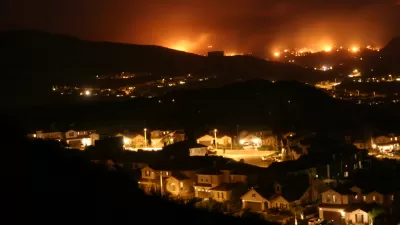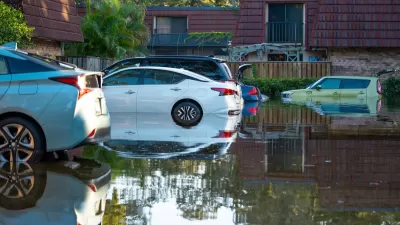Home insurers argue they should be able to base policy costs on modeling that accounts for future risks from climate change and overdevelopment.

The home insurance industry is calling on California to discourage construction in fire-prone zones by allowing insurers to account for future risks when evaluating policy applications. With climate change causing more extreme wildfire seasons and development pushing farther into high-risk areas, reports Debra Kahn, California insurers anticipate increasingly severe damage from wildfires. Meanwhile, homeowners in fire zones are finding it more difficult to secure policies or seeing their rates rise dramatically, even through the state's last-resort option, the FAIR plan. In October, the state temporarily banned insurers from dropping homeowners in areas affected by recent major wildfires.
Consumer watchdog groups warn that the proposed model, dubbed "catastrophic modeling" and used in every state except California, would defy consumer protection laws, and the state's insurance commissioner, Ricardo Lara, has shown reluctance to change the policy, opting to focus on a "consumer-oriented" approach that protects homeowners from exorbitant rate hikes. State politicians are similarly hesitant to dictate where development can happen, citing concerns that restrictions on construction could worsen the state's housing shortage.
But some experts warn that increased reliance on the FAIR program for the highest-risk homeowners could put an undue burden on taxpayers, much like FEMA's beleaguered flood insurance program. In Florida, which experiences frequent hurricanes and flooding, regulations on the insurance industry tie insurance to "more-stringent building codes, with incentives for going beyond the standards to install the sturdiest doors and windows" to reduce risks.
FULL STORY: California continues to face wildfire risks. Insurers think they have an answer.

Alabama: Trump Terminates Settlements for Black Communities Harmed By Raw Sewage
Trump deemed the landmark civil rights agreement “illegal DEI and environmental justice policy.”

Study: Maui’s Plan to Convert Vacation Rentals to Long-Term Housing Could Cause Nearly $1 Billion Economic Loss
The plan would reduce visitor accommodation by 25% resulting in 1,900 jobs lost.

Planetizen Federal Action Tracker
A weekly monitor of how Trump’s orders and actions are impacting planners and planning in America.

Federal Homelessness Agency Places Entire Staff on Leave
The U.S. Interagency Council on Homelessness is the only federal agency dedicated to preventing and ending homelessness.

Restoring Northern India’s Himalayan ‘Water Temples’
Thousands of centuries-old buildings protect the region’s natural springs and serve as community wells and gathering places.

Milwaukee to Double Bike Share Stations
Bublr Bikes, one of the nation’s most successful, will add 500 new e-bikes to its system.
Urban Design for Planners 1: Software Tools
This six-course series explores essential urban design concepts using open source software and equips planners with the tools they need to participate fully in the urban design process.
Planning for Universal Design
Learn the tools for implementing Universal Design in planning regulations.
Caltrans
Smith Gee Studio
Institute for Housing and Urban Development Studies (IHS)
City of Grandview
Harvard GSD Executive Education
Toledo-Lucas County Plan Commissions
Salt Lake City
NYU Wagner Graduate School of Public Service





























